See This Report on Geotheta
See This Report on Geotheta
Blog Article
Some Known Details About Geotheta
Table of ContentsThe Buzz on GeothetaThe Basic Principles Of Geotheta Indicators on Geotheta You Should KnowWhat Does Geotheta Do?Geotheta Can Be Fun For Anyone

They carry out website examinations, accumulate examples, execute laboratory examinations, and analyze data to evaluate the suitability of the ground for construction projects - Tailings Engineer. Based on their searchings for, geotechnical designers give referrals for structure layout, incline security, preserving frameworks, and reduction of geotechnical dangers. They work together with various other specialists, such as engineers, structural engineers, and construction groups, to make certain that geotechnical factors to consider are incorporated into the overall task design and implementation
By assessing the actions and properties of dirt and rock, they can determine prospective geotechnical threats such as landslides, dirt settlement, or incline instability. Their expertise aids stop failures or crashes that might endanger lives and home. Here are some thorough tasks and obligations of a geotechnical designer: Site Examination: Geotechnical designers conduct site examinations to gather information on subsurface problems.
They analyze the data to understand the residential or commercial properties and behavior of the dirt and rock, including their toughness, leaks in the structure, compaction attributes, and groundwater problems. Geotechnical Analysis and Layout: Geotechnical designers evaluate the data accumulated throughout website investigations to assess the security and suitability of the site for building and construction tasks. They carry out geotechnical calculations and modeling to review aspects such as bearing capacity, negotiation, slope security, lateral planet stress, and groundwater flow.
Everything about Geotheta
Structure Design: Geotechnical designers play an essential duty in developing structures that can safely sustain the desired framework. They examine the soil problems and lots requirements to establish the appropriate foundation kind, such as superficial structures (e.g., grounds), deep foundations (e.g (https://www.imdb.com/user/ur185987626/?ref_=nv_usr_prof_2)., stacks), or specialized techniques like soil improvement. They think about variables such as settlement limitations, birthing capacity, and soil-structure communication to establish optimum foundation styles
They examine construction strategies, monitor site tasks, and carry out field evaluations to validate that the layout referrals are adhered to. If unpredicted geotechnical problems develop, they assess the situation and offer suggestions for remediation or changes to the style. Risk Analysis and Reduction: Geotechnical engineers analyze geotechnical hazards and risks related to the task site, such as landslides, liquefaction, or soil disintegration.

Partnership and Interaction: Geotechnical engineers function closely with other experts associated with a job, such as designers, structural designers, and building teams. Effective communication and cooperation are vital to incorporate geotechnical factors to consider into the overall job layout and building and construction process. Geotechnical engineers supply technological knowledge, answer inquiries, and guarantee that geotechnical needs are satisfied.
Getting The Geotheta To Work
Below are some kinds of geotechnical designers: Foundation Designer: Foundation designers specialize in creating and analyzing foundations for structures. They examine the dirt problems, tons needs, and website qualities to establish one of the most appropriate foundation kind and style, such as shallow foundations, deep foundations, or specialized methods like pile structures.
They assess the aspects affecting slope security, such as soil properties, groundwater problems, and incline geometry, and create techniques to avoid incline failings and alleviate dangers. Quake Engineer: Earthquake engineers concentrate on evaluating and making frameworks to withstand seismic pressures. They examine the seismic threat of a website, assess soil liquefaction potential, and develop seismic style standards to make certain the safety and security and durability of frameworks during quakes.
They perform area screening, accumulate samples, and analyze the collected information to identify the soil buildings, geologic formations, and groundwater conditions at a site. Geotechnical Instrumentation Engineer: Geotechnical instrumentation designers concentrate on monitoring and determining the habits of dirt, rock, and frameworks. They set up and preserve instrumentation systems that keep track of variables such as soil settlement, groundwater levels, slope activities, and architectural displacements to analyze performance and supply early warnings of potential problems.
The Single Strategy To Use For Geotheta
They carry out tests such as triaxial tests, debt consolidation examinations, direct shear tests, and permeability tests to collect data for i was reading this geotechnical evaluation and design. Geosynthetics Designer: Geosynthetics engineers concentrate on the design and application of geosynthetic materials, such as geotextiles, geogrids, and geomembranes. They utilize these materials to improve dirt security, strengthen slopes, provide water drainage services, and control disintegration.
They have a tendency to be investigatory individuals, which indicates they're intellectual, reflective, and curious. They are curious, systematic, logical, analytical, and sensible. Some of them are also social, implying they're kind, charitable, cooperative, person, caring, useful, empathetic, skillful, and friendly - Geotechnical Engineers.
In the office atmosphere, geotechnical designers utilize specialized software application tools to execute calculations, develop designs, and assess data. They prepare reports, testimonial project specs, interact with customers and group members, and coordinate task tasks. The workplace setup gives a favorable atmosphere for research, analysis, and partnership with various other specialists included in the project.
The 20-Second Trick For Geotheta
They frequently visit project websites to carry out website examinations, analyze geotechnical conditions, and gather information for analysis. These gos to involve taking a trip to various areas, in some cases in remote or difficult surfaces. Geotechnical designers may perform soil tasting, conduct tests, and screen construction activities to make sure that the geotechnical elements of the project are being applied correctly.
Geotechnical designers likewise work in specialized geotechnical research laboratories. Geotechnical lab engineers function extensively in these settings, handling screening devices, operating instruments, and taping data.
Report this page